Don't wanna be here? Send us removal request.
Text
Следующее (когда-нибудь?) - китайский/японский и вязание
Столярное дело ещё))
Ну и ещё что найду
5 notes
·
View notes
Text
работать из дома.
плюсы: не нужно никуда выходить
минусы: не нужно никуда выходить
плюсы: можно работать удаленно, из любой точки мира
минусы: можно работать удаленно, из любой точки мира
0 notes
Text
философы, должно быть, самые счастливые люди на свете.
или же самые - несчастные.
отдает банальностью цитатных пабликов, но правда ж. избитые цитаты потому и избитые, потому что правдивые
0 notes
Text
the world when I read everything I've reposted:

Study Motivators That Work
The 3 Minute Rule
When you have a task that you don't want to complete, just get started and keep going for 3 minutes. If you still don't want to complete the task after 3 minutes, stop and start another task
This method can be very challenging during the initial stages of trying it
When you procrastinate, you tend to find something else to do first to dodge the main task at hand
This rule forces you to immediately avoid any deviation from completing the task for 3 solid minutes with the option to stop after those 3 minutes
Discipline plays a crucial role in this motivation technique as starting the 3 minutes requires you to overcome procrastination
Something that helps in this process is trying to slightly mentally detach yourself from the situation to have an objective view on it
You need to look at the situation and acknowledge that you have the freedom to stop the task after 3 minutes if you truly cannot complete it and that you absolutely must start the task immediately
Often times, I keep going once I start which results in significantly improved productivity
Flexibile Schedules
Often times, I plan out the perfect study and work session with my tasks and times detailed to the second
However, sometimes, life gets in the way of these plans and I'm forced to reschedule everything
Something like this can be extremely demotivating, especially if your day revolved around your very detailed plan
To help solve such issues, there are 2 options for 2 different scenarios
The first option is to prevent the situation from occurring at all
Extremely rigid and detailed plans are very easy to disrupt
Preventing the situation would be done by outlining more flexible study and work plans that can be done at most times and don't rely on strict timings (I will post another article on creating a flexible and functional study schedule)
The second option is how to move forward if you do find yourself in a situation where your study plans have been disrupted and you're demotivated
In this instance, the first step is to list the topics you need to cover and sort them from most important to least important
Estimate how much time each topic will take and look at how much time you have available
Evaluate if the time you have available is adequate to completely cover all of your listed topics
If not, choose as many topics with the greatest priority that will be able to be completed within your available time
Remember, these steps should be completed within 5 minutes at most to prevent you from losing any more time
There's always a plan for every situation. It just needs to be found.
Justify It
If you truly feel like there's no reason to compete the task, find a reason
If the task is important enough for you to lament over it, it's certainly important enough for you to complete it as soon as possible
Clear your mind of any frustration and just relax
Think of what the purpose of the task is
Do you need to complete an assignment that will be a part of your final grade?
Do you need to complete a report for your job?
Will this benefit you in the future - near or far?
If you need to study, what is your end goal?
When I hesitate with my studying, I always remind myself that what I'm learning now will one day help me improve as a doctor
Once you identify a reason, act on it and complete the task
The reason will help you sense that what you're doing has meaning and purpose, making the task less of an inconvenience and more of a duty
Knowledge is always valuable.

4K notes
·
View notes
Text
God bless hard science. Oftentimes I can really get tired and overwhelmed from uncertainty and openness of liberal arts. Whereas in hard science (at least the topics from the school programme) the results are exact and clear
1 note
·
View note
Text


Btw the fact that time is not constant and can slow down or speed up really blew my mind when I learned about this fact
0 notes
Text
🤔🧠👀

HOW I PLAN MY WEEK AS A PHD STUDENT
I found the lack of structure and timetabled events the most difficult adjustment to make when I started my PhD last month. I love structure and I love routine, being without one made me panic quite a bit. One thing that has helped with this adjustment is planning my weeks using Google Calendar.

I have 5 separate calendars:
DAILY
This is the calendar I use to schedule mundane events and tasks that happen on a daily basis. At the minute, this just consists of scheduling in a lunch hour and taking my meds.

PERSONAL
My personal calendar is used for significant events in my personal life that have been planned weeks in advance and shouldn't be missed unless there's an emergency. As you can see, this week I had an appointment for my eyelash extensions and I also have a gig on Saturday. I have the alerts for this calendar switched on so I never forget when I have something important coming up.

PHD
This calendar is used to mark important milestones and events relating to my PhD. This includes mandatory lectures (I only have 3 this semester, and 2 have already passed!), meetings with my supervisors and academic advisor and deadlines.

TO-DO
My to-do calendar is the one that gets used the most regularly. Instead of writing a to-do list, I put the things that have to be done into my calendar with an allotted amount of time. If I know how I want to spend my week, I can do this on a Monday morning and other times I'll do it on a day-to-day basis. This week I know there's certain things I need to do while they're still fresh in mind and so I've already filled them in. Before using this method, I'd find that a to-do list is way too flexible for the way my mind works and I'd spend hours on a task that only really should've taken 30 minutes. I find that my time blocking my to-do list, the things on the list actually get done and I'm more productive with my time

WORK
My last calendar is for work. At the moment, I teach at the university, I tutor high school maths and I am also a specialist mental health mentor and counsellor. All of the hours I spend working are put into my work calendar so it's easy to keep track of my hours worked and, in turn, my expected pay every month.

875 notes
·
View notes
Text
An adventure
When learning a foreign language, one of the most foundational principles is “learning by doing”. I love it so much because of its elegance. So, basically it implies that if you want to learn to speak in a foreign language - you have to speak, if you want to write - then write and so on. As simple as it is.
So, for me this is a starting point of my journey to better English writing skills. There might be mistakes in this text, but I’m not going to check and correct it now, because mistakes are not to be afraid of or to be ashamed of, they are essential part of any learning.
Let’s hope this isn’t the first and the last post here.
To the people who in any way inspired me to start this.
0 notes
Text
Intermediate plateau. Vocabulary
“Непреодолимый порог. Серьëзно?! Чаще всего ко мне приходят студенты с такими жалобами: «Вот до B2 дошëл / дошла, а дальше не могу. Ну никак не идëт. C1 – это нереально сложно, наверное. Или может быть, мне просто не дано?» Первое, что я делаю в такой ситуации, – провожу небольшую «психотерапию». Объясняю студентам, что они у себя самые лучшие и что им всё по силам. А дальше – отставить уныние и перейдём к делу! Порог между B2 и C1 – это один из самых серьёзных ключевых моментов в изучении языка. И преодолеть этот порог действительно бывает сложно. Но не потому, что язык уровней C1 и C2 – это что-то волшебное и доступное только избранным. А потому, что работа с языком на этих уровнях от��ичается принципиально. Давайте разберёмся, в чём же заключаются эти принципиальные отличия. Менее частотная и более сложная лексика. Более сложная лексика = лексика с многокомпонентным значением. Звучит страшно, правда? Но на деле всё не так ужасно. Возьмём слова «consequence» и «repercussion» /ˌriː.pəˈkʌʃ.ən/, которые мы с вами недавно изучали в нашем Vocabulary Research. consequences = something that happens as a result of a particular action or set of conditions repercussion = the effects of an action or event, especially bad effects that continue for some time Видим, что «consequence» – это вполне прямолинейное и нейтральное слово, то есть просто последствия. А вот «repercussion» уже более «навороченное», типичное для C1 и C2. Здесь мы видим целых три компонента значения: effects + bad + continue for some time. Сложные коммуникативные задачи. На уровнях C1 и C2 нам уже нужно не просто донести мысль в общих чертах, а приходится выполнять более сложные коммуникативные задачи, где язык используется как инструмент выполнения этих задач. Например, нужно аргументировать своё мнение по какому-то проблемному вопросу, взвесить плюсы и минусы при принятии решения, описать глобальные тенденции, убедить собеседника в своей правоте. То есть говорить не просто красиво или «продвинуто», вворачивая классные фразочки, но и при этом достигать свою коммуникативую цель. Здесь без коммуникативных стратегий уже не обойтись. Языковые конструкции. Совсем недавно мы уже говорили о том, что репертуар носителей и продвинутых пользователей языка очень разнообразен. То есть, например, строя свои предположения о чём-то или делая выводы о происходящем, носители будут пользоваться не только грамматикой (модальными глаголами might / must / may etc.), но и конструкциями, которые выполняют ту же функцию, но часто звучат более естественно. Нужен language upgrade. На уровнях C1 и C2 уже не исправляют ошибок. Значит ли это, что студентам не нужна помощь? Ещё как нужна! Просто помощь более сложная. Например, студентам важно знать, как они могут выразить уже высказанную мысль более точно, ярко и эффективно в определённом контексте. И часто, конечно, просто более классно!”
Source: https://vk.com/feed?section=likes&w=wall-184325443_398
0 notes
Text
What is actually going on in yemen:
CHOLERA OUTBREAK
the cholera pandemic has been going on since around 2016, and it continues to get worse every day due to the lack of public health sectors and aid, as well as the saudi led air strikes on water systems and food infrastructure
HUMANITARIAN CRISIS
yemen currently has the biggest humanitarian crisis in the world, with over 24 million people in need of aid
FAMINE
the famine in yemen is said to become the worst one in 100 years and it continues to get worse ever day due to the poor funding and saudi intervention (with the support of the us, uk & france). nearly half the population will soon be dependent on aid
CIVIL WAR
it started when the houthis (backed by iran) rebelled against the government and began to seize territories (taking over the capital sana'a). in order to get the houthis out, saudi began bombing yemen and thus the conflict worsened
WAR
saudi arabia (with the support of the us, uk and france) has been bombing yemen in order to get rid of the houthi rebels. this led to the deterioration of yemen's situation, as well as the death of many civilians. they target public infrastructure, water systems, schools, etc
CORONAVIRUS
there aren't many testing kits and the hospitals aren't equipped with treating it. basic necessities such as masks and gloves also aren't available, thus making the situation worsen (especially with everything else going on adding to it)
FLOODS
lately yemen has been experiencing really bad floods that have torn down homes, destroyed food supplies and killed people. these floods have attributed to the spread of disease too
PLAGUE
yes, there is literally a plague now. it seems to have come after the floods, and has people are dropping dead. i think they still haven't found the cause but it affects your lungs. i don't know too much on this issue though, so please add if you have more information.
ECONOMIC CRISIS
since the start of the civil war in 2015, yemen's economy contracted by 50% due to the inflation and devaluation of the rial. people are hungry because of poverty and lack of jobs, and while you could potentially flee war, you can't flee hunger.
BLOCKADE
the saudi military coalition currently has a blockade on yemen's sea, air & land ports which stops aid from coming in. though they apparently eased it a little, it's still there and having catastrophic effects on the situation.
EXTRA
here's more stuff that's happening in yemen
- no water & electricity
- high poverty rates
- food prices are too expensive
- multiple serious disease eg meningitis
- isis & al gaeda have carried out attacks
- corruption
ADDITIONAL NOTES
of course this isn't everything, all of these factors have consequences, like the collapse of public health sectors but i can't fit it all in. please research and educate yourselves on the situation, we're blessed to be in a time with multiple sources
7K notes
·
View notes
Note
I keep getting ser and estar mixed up 😭
hello amigo!
actually this is easy. just like english, you can use the verb “to be” to refer to different meaning to address essential qualities/characteristics or conditions.
The apple is green. (Condition: Meaning the apple is not ripe.)
The apple is green. (Essential: Meaning the color of the apple is green.)
in spanish we have the same but with we differentiate the meaning with two verbs: ser and estar.
SER AND ESTAR
Ser is used to address an essential quality while Estar is used to address a condition.
La banana está verde: The banana is green. (condition). Meaning that the fruit is unripe.
La banana es verde: The banana is green. (essence). Meaning the fruit color is green.
So what you can gather from that example is that Ser is used to talk about what something is and Estar is used to talk about how something is. Something that maybe you’ll see on the internet or in books is that Ser is for permanent things/subjects and Estar is for temporary things/subjects but i want you to forget that or ignore it since there can be a lot of different situations where that doesn’t apply so it doesn’t truly apply to the verbs.
Mi amigo es malo en clases
(My friend is bad in classes). You see i use the verb “ser” but that doesn’t mean that the boy will be permanently bad in class, he can improve in the future so the “rule” doesn’t apply, and there are tons of other examples with that similarity.
what you can do is use these acronyms:
SER = DOCTOR (Description, Occupation, Characteristics, Time, Origin, Relationship)
ESTAR = PLACE (Position, Location, Action, Condition, Emotion)
but before i give you some examples of like you to know that these two verbs are irregular which means that they change depending on the person and time that they are used. So check the Dictionary from the Real Academia Española (RAE), verb “ser”; verb “estar”.
there are some exclusive situations where only applies to each verb separately.
Ser Exclusives:
Name: Mi nombre es Oskar (My name is Oskar) - Description
Origin/Nationality: Soy de El Salvador (I’m from El Salvador) - Origin
Profession/Activity: Yo soy estudiante (I am an student) - Occupation
Religion/Lack of belief: Ella es cristiana (She is christian) - Characteristic
Identity: Ella es la hija de mi hermana (She is my sister’s daughter) - Relationship
Time: Son las tres de la tarde (It is three in the afternoon) - Time
Descriptions: Su cabello es de color naranja (Her hair color is orange) - Description/Characteristic
Price: Son cuatro dolares y tres centavos (It is four dollars and three cents)
You can also know when to use “Ser” when the noun follows the verb; also to tell where something is from; or simply tell where an event is taking place
Estar Exclusives:
Location (not events): El celular está en la mesa (The cellphone is on the table) - Location/Position
“Be present/be ready”: ¿Cuándo estará la comida? (When will the food be [ready]?) - Condition
Estar + progressive tense: Mi hermano está cocinando la cena (My brother is cooking the dinner) - Action
Physical/Emotional state: Estoy triste (I am sad) - Emotion
To express agreement or disagreement: Estoy de acuerdo con el profesor (I agree with the teacher) - Condition
Estar is used to tell where something is located right now.
Also there are times where you can use both verbs but it all depends on the meaning, the mostly applies when the verb is follow by an adjective since the can help change the meaning from an essential quality to a condition.
La maestra está aburrida. (Emotion): The teacher is bored.
La maestra es aburrida. (Description): The teacher is boring.
Everything depends on the meaning behind your intentions. I hope this helps with your question, and see that is actually easy at the end. Have a great day!!
122 notes
·
View notes
Text
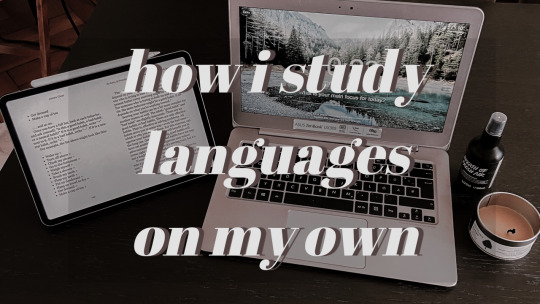
click here for my new video! i’m sharing some language learning study tips that i use to self-study languages at home, featuring apps, websites, podcasts and books that i really enjoy using!! hopefully this will be helpful and inspire some of you :) if you enjoy my videos, please leave a like/sub, that would be so appreciated!!
11K notes
·
View notes
Photo
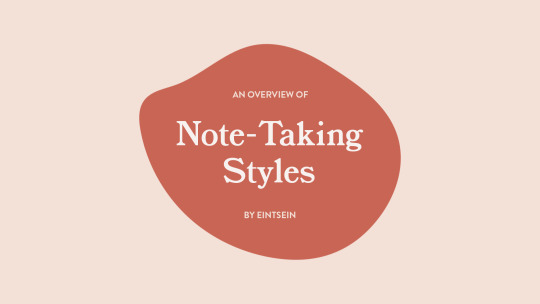

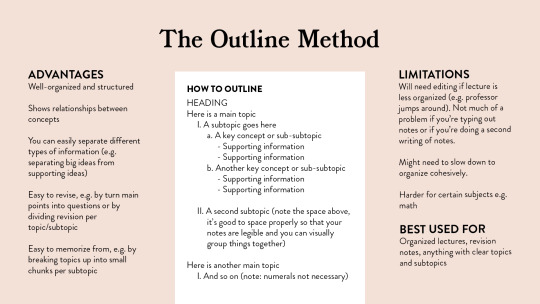
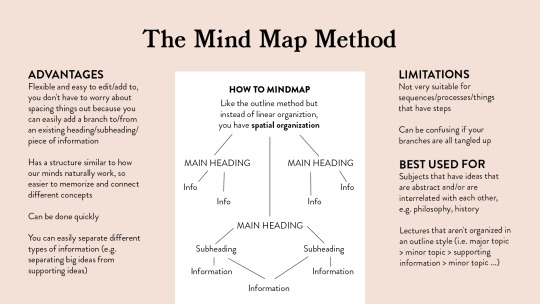

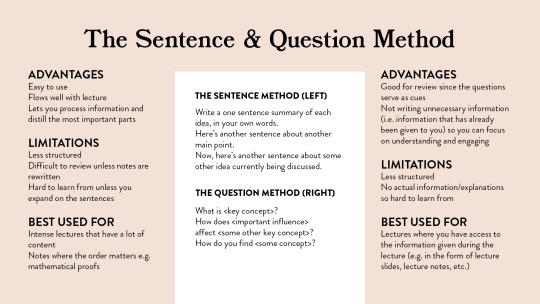
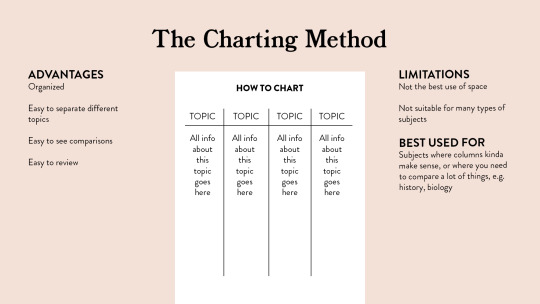


An Overview of Note-Taking Styles
Note-taking is one of the most essential skills a student should master. It allows you to record and review information to be used in the future. But what’s the best way to do so? Here’s an overview of note-taking styles that can help you maximize your learning!
56K notes
·
View notes
Text
How to Study Like a Harvard Student
Taken from Sophia Chua-Rubenfeld, daughter of the Tiger Mother
Preliminary Steps 1. Choose classes that interest you. That way studying doesn’t feel like slave labor. If you don’t want to learn, then I can’t help you. 2. Make some friends. See steps 12, 13, 23, 24. General Principles 3. Study less, but study better. 4. Avoid Autopilot Brain at all costs. 5. Vague is bad. Vague is a waste of your time. 6. Write it down. 7. Suck it up, buckle down, get it done. Plan of Attack Phase I: Class 8. Show up. Everything will make a lot more sense that way, and you will save yourself a lot of time in the long run. 9. Take notes by hand. I don’t know the science behind it, but doing anything by hand is a way of carving it into your memory. Also, if you get bored you will doodle, which is still a thousand times better than ending up on stumbleupon or something. Phase II: Study Time 10. Get out of the library. The sheer fact of being in a library doesn’t fill you with knowledge. Eight hours of Facebooking in the library is still eight hours of Facebooking. Also, people who bring food and blankets to the library and just stay there during finals week start to smell weird. Go home and bathe. You can quiz yourself while you wash your hair. 11. Do a little every day, but don’t let it be your whole day. “This afternoon, I will read a chapter of something and do half a problem set. Then, I will watch an episode of South Park and go to the gym” ALWAYS BEATS “Starting right now, I am going to read as much as I possibly can…oh wow, now it’s midnight, I’m on page five, and my room reeks of ramen and dysfunction.” 12. Give yourself incentive. There’s nothing worse than a gaping abyss of study time. If you know you’re going out in six hours, you’re more likely to get something done. 13. Allow friends to confiscate your phone when they catch you playing Angry Birds. Oh and if you think you need a break, you probably don’t. Phase III: Assignments 14. Stop highlighting. Underlining is supposed to keep you focused, but it’s actually a one-way ticket to Autopilot Brain. You zone out, look down, and suddenly you have five pages of neon green that you don’t remember reading. Write notes in the margins instead. 15. Do all your own work. You get nothing out of copying a problem set. It’s also shady. 16. Read as much as you can. No way around it. Stop trying to cheat with Sparknotes. 17. Be a smart reader, not a robot (lol). Ask yourself: What is the author trying to prove? What is the logical progression of the argument? You can usually answer these questions by reading the introduction and conclusion of every chapter. Then, pick any two examples/anecdotes and commit them to memory (write them down). They will help you reconstruct the author’s argument later on. 18. Don’t read everything, but understand everything that you read. Better to have a deep understanding of a limited amount of material, than to have a vague understanding of an entire course. Once again: Vague is bad. Vague is a waste of your time. 19. Bullet points. For essays, summarizing, everything. Phase IV: Reading Period (Review Week) 20. Once again: do not move into the library. Eat, sleep, and bathe. 21. If you don’t understand it, it will definitely be on the exam. Solution: textbooks; the internet. 22. Do all the practice problems. This one is totally tiger mom. 23. People are often contemptuous of rote learning. Newsflash: even at great intellectual bastions like Harvard, you will be required to memorize formulas, names and dates. To memorize effectively: stop reading your list over and over again. It doesn’t work. Say it out loud, write it down. Remember how you made friends? Have them quiz you, then return the favor. 24. Again with the friends: ask them to listen while you explain a difficult concept to them. This forces you to articulate your understanding. Remember, vague is bad. 25. Go for the big picture. Try to figure out where a specific concept fits into the course as a whole. This will help you tap into Big Themes – every class has Big Themes – which will streamline what you need to know. You can learn a million facts, but until you understand how they fit together, you’re missing the point. Phase V: Exam Day 26. Crush exam. Get A.
238K notes
·
View notes
Text
french resources masterpost
i don’t even know where to begin with french…i love learning languages so much, i really wish my parents had started me when i was younger. i started taking french in seventh grade but i really hope to spend a semester abroad in france & visit senegal when im older. however, french can get super crazy with accents and hard pronunciation and fancy vocab, which can get really confusing, so here’s a masterpost w all of the french resources i’ve gathered :)
where to start
duolingo aka the most amazing free language learning program ever
rosetta stone- i’ve heard really great things about this program, but it is not free
bonjour- this website is rlly helpful & even if you’re already in a french class like me, you can find lots of resources for when you’re confused :) plus it’s free!!
babbel- they have programs for beginners + advanced
grammar + spell check
bonpatron- grammer + spell check
languagetool- grammar + spell check
reverso- grammer + spellcheck
how to change the spellcheck language on word
dictionaries
collins
word reference (this is my personal favorite, i highly recommend it + it is so much better than google translate & much more reliable!!)
larousse
linternaute
linguee (this one is probably my second favorite)
you can get word reference (free!!) on the app store, as well as linguee (which i think is free as well??)
phonology
french vs english phonology
french pronunciation for beginners
pronunciation chart
guide to french pronunciation
exercises you could try
+ more practice
the ultimate guide to french pronunciation w videos!!
10 pronunciations you won’t learn in school
ok so i just found out the other day that if you’re on flashcards on quizlet & you press the little speaker icon it will say the word for you!! this has been super helpful on my auditory quizzes + generally getting a feel for the pronunciation of words. but i wouldn’t say it’s too reliable so definitely check out these other resources (link to quizlet)
grammar
passe compose help (past tense)
passe compose w/ avoir
passe compose w/ etre
passe compose practice (+ more)
imparfait vs passe compose
a helpful post explaining imparfait vs passe compose
intro to accents
type french accents w/o a french keyboard (just copy/paste into your document)
how to put accents on letters
noun gender
7 tips on learning french grammar
grammar practice
conjugation practice
how to conjugate
french grammar masterpost
music
these are a few of my favorites:
stromae- hip hop//electronic but i still like his music
maitre gims- rapper but he sings quite a bit in his songs
joyce jonathan- omg her songs are so cute please go listen
christophe mae-can we just talk about his song “tombe sous le charme” i love it + he sort of reminds me of jack johnson
vianney!!- guys “je te deteste” is my favorite song on my french playlist right now. the sophomore that sits next to me in our french class recommended him to me & i can’t stop listening
christine & the queens
also check out these links for more music:
universal music france
this post with french music recommendations
my post on music//podcasts for learning languages (lots of people have been recommending artists which has made this post so much better so please message me if you have any other recommendations or questions!!)
8tracks- french music
other stuff to listen to//watch
french youtubers
10 podcasts for french learners
the ten best tv shows to watch for french learners
ok don’t throw anything at me but watching peppa pig in french is actually a good method (i don’t remember who suggested this to me but thank you so much @ whoever it was)
easy to understand french movies
news + culture
savoirs
euronews
1jour1actu
l’humanite
multilingual books
some blogs (not on tumblr) in french + about french culture (frenchcrazy, i learn french, oui, c’est ca, french together, fluentfrenchnow)
my tips
definitely keep a vocab notebook where you can either paste vocab lists or write them in on your own
listen to french music. find your own favorite artists. and tell me, so i can put them in here. but seriously, go do it & get those phrases + pronunciations stuck in your head!!
making quizlets for vocab will benefit you more than just using someone else’s
find friends in your class to help (if you’re in highschool, upperclassmen are a blessing pls go ask them questions if you’re lost in class), the senior that sits next to me is really good at conjugating, and i’m pretty good at remembering vocab so we make a great team
find/join a study group!! the freshman girls in my french class made a group chat & we all send links to quizlets/other resources & help each other with homework 24/7
ask questions/do speaking exercises during class. trust me, you will benefit from it. plus, having your teacher correct you on your pronunciation during class is much less embarrassing than getting an F on that speaking test
french help on tumblr
this french idiom masterpost
more french resources
french grammer masterpost
if you’re still looking for help, definitely check out the tag #langblr
or ask me a question here
or send me a message
or ask any studyblr studying french :))
my posts
essay masterpost
studying when ill masterpost
music resources for language learners
studying a foreign language
i hope this helped!! :)
21K notes
·
View notes